Taming Inflammation Naturally: Endometriosis Relief
Endometriosis pain can feel relentless, but what if you could reduce it by targeting the root cause—chronic inflammation? Discover how a holistic approach to endometriosis relief can help you regain control of your body, ease your pain, and improve your quality of life with every step.
INTRODUCTION
Endometriosis is a chronic condition that affects millions of women globally. It occurs when tissue similar to the uterine lining grows outside the uterus, causing severe pain, heavy menstrual periods, and sometimes infertility. Inflammation is a major player in the progression of endometriosis, aggravating symptoms and contributing to the growth of endometrial-like tissue. While there is no definitive cure, managing inflammation is critical for achieving endometriosis relief.
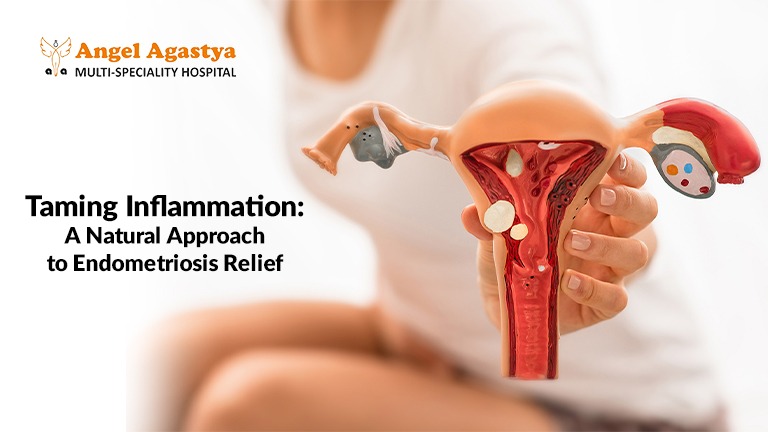
In this blog, we will explore how a holistic approach, including diet, lifestyle changes, supplements, and professional medical intervention, can help you manage inflammation and achieve endometriosis relief. Whether you’re newly diagnosed or have been battling endometriosis for years, these strategies will provide a comprehensive guide to managing your condition naturally.
What is Endometriosis?
Endometriosis occurs when tissue that resembles the endometrium (the lining inside the uterus) grows outside the uterine cavity. These tissues can be found on the ovaries, fallopian tubes, and other parts of the pelvic region. Just like the uterine lining, these tissues react to the menstrual cycle by thickening and shedding. However, unlike the lining inside the uterus, there’s no way for this tissue to exit the body, leading to inflammation, scar tissue, and painful adhesions. Understanding the role of inflammation can unlock pathways to endometriosis relief through targeted interventions.
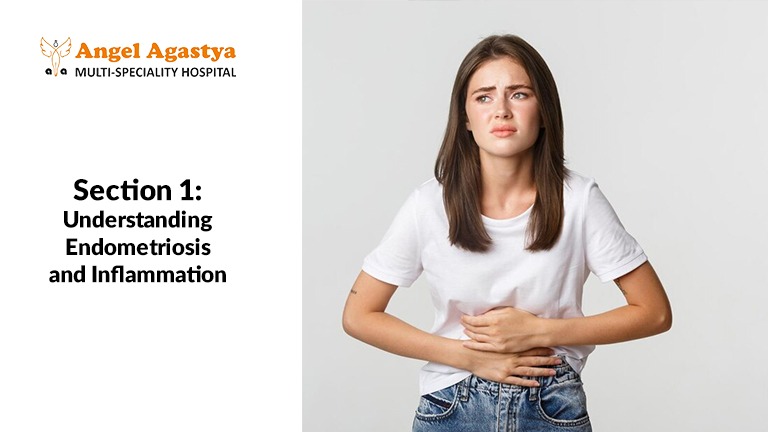
The Role of Inflammation in Endometriosis
Inflammation is the body’s natural response to injury or infection, but in chronic conditions like endometriosis, it can become a long-lasting issue. In women with endometriosis, the immune system releases inflammatory chemicals like inflammatory substances in response to the misplaced endometrial tissue. This chronic inflammation leads to swelling, increased pain, and tissue damage in the pelvic area, worsening the symptoms of endometriosis.
Understanding the inflammatory nature of endometriosis allows for targeted interventions that can reduce this inflammation and alleviate symptoms. Inflammation worsens endometriosis symptoms. you can significantly improve your overall well-being and achieve endometriosis relief. Addressing inflammation through holistic methods, such as dietary changes and stress management, you can significantly improve your overall well-being and achieve endometriosis relief.
Dietary Strategies for Endometriosis Relief
The Anti-Inflammatory Diet
An anti-inflammatory diet is crucial for achieving endometriosis relief. A key component in managing endometriosis is reducing inflammation through diet. Certain foods can trigger or worsen inflammation, while others have anti-inflammatory properties that help combat it. An anti-inflammatory diet should focus on whole, nutritious foods that provide essential vitamins, minerals, and antioxidants to reduce inflammation throughout the body.
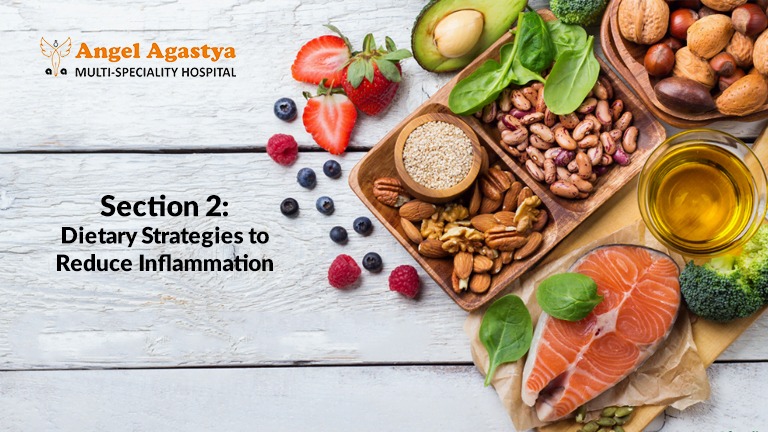
Foods to Include:
1.Colorful Fruits and Vegetables:Brightly colored fruits and vegetables are rich in antioxidants and polyphenols, which help neutralize free radicals and reduce inflammation. Examples like blueberries and spinach are excellent for inflammation reduction and endometriosis relief.
2.Fatty Fish:Fatty fish such as salmon, mackerel, and sardines are high in omega-3 fatty acids, which are potent anti-inflammatory agents. Omega-3-rich salmon and sardines directly aid in endometriosis relief
3. Nuts and Seeds: Almonds, flaxseeds, and chia seeds are great sources of omega-3s and other healthy fats that support hormonal balance, promoting endometriosis relief.
4. Whole Grains:Whole grains like quinoa, brown rice, and oats are high in fiber and nutrients, which support gut health and reduce inflammation. Avoid refined grains, which can trigger spikes in blood sugar and increase inflammatory markers.
5. Healthy Fats: Incorporating healthy fats from sources like olive oil, avocados, and walnuts can help modulate the inflammatory response and promote overall hormonal health.
Foods to Limit:
1. Processed Foods: Packaged snacks, fast foods, and processed meats often contain trans fats, high amounts of sugar, and artificial additives hindering endometriosis relief.
2. Sugary Drinks:Soft drinks and fruit juices high in added sugars can spike insulin levels, contributing to inflammation and hormonal imbalances.
3. Red Meat and Dairy:Some studies suggest that red meat and high-fat dairy products may contribute to inflammation and worsen symptoms in women with endometriosis.
4. Refined Carbohydrates: White bread, pastries, and other refined carbs can cause blood sugar spikes and contribute to inflammation. Opt for whole grains and complex carbs instead.
Lifestyle Modifications for Inflammation and Endometriosis Relief
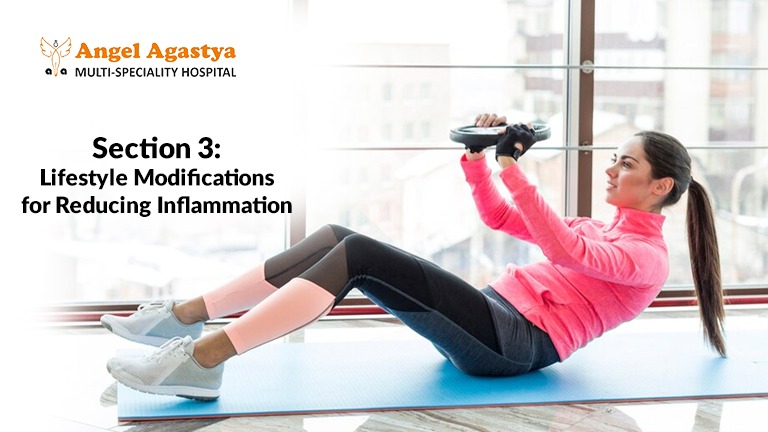
Regular Exercise
Exercise is an effective way to reduce inflammation and improve overall health. Physical activity helps lower levels of inflammatory markers, improves circulation, and supports hormonal balance. For women with endometriosis, regular moderate exercise can help alleviate pain, boost mood, and increase energy levels.
Engage in activities such as:
Yoga:Certain yoga poses can stretch the pelvic muscles and reduce pain while helping to lower stress levels.Activities like yoga and walking alleviate pelvic pain and support endometriosis relief.
Swimming or Cycling: These are gentle on the joints and can help improve cardiovascular health without putting too much strain on the body.
Walking:A low-impact activity that improves circulation and reduces stress.
Aim for at least 30 minutes of moderate exercise on most days of the week, but listen to your body and adjust accordingly.
Stress Management
Chronic stress is closely linked to inflammation and can worsen symptoms of endometriosis. High levels of stress hormone, the body’s primary stress hormone, can disrupt hormonal balance and increase the inflammatory response. Incorporating stress-reducing techniques into your daily routine can make a significant difference in managing endometriosis.Mindfulness practices help lower cortisol and foster endometriosis relief.
Consider incorporating these stress-relieving practices:
Meditation and Mindfulness: Mindfulness practices like meditation and deep breathing help calm the nervous system, reduce cortisol levels, and lower inflammation.
Journaling:Writing down your thoughts and feelings can help you process emotions and reduce stress.
Breathing Exercises:Practicing diaphragmatic breathing (deep breathing) can help reduce tension in the body and calm the mind.
Adequate Sleep
Good sleep hygiene ensures optimal hormonal balance, aiding endometriosis relief.Sleep is essential for hormone regulation and reducing inflammation. Poor sleep can increase stress levels, disrupt hormonal balance, and exacerbate endometriosis symptoms. Aim for 7-9 hours of quality sleep each night by practicing good sleep hygiene:
– Establish a bedtime routine.
– Limit exposure to screens before bed.
– Keep the bedroom cool, quiet, and dark.
– Avoid caffeine and heavy meals late in the evening.
Supplements and Herbal Remedies Endometriosis Relief
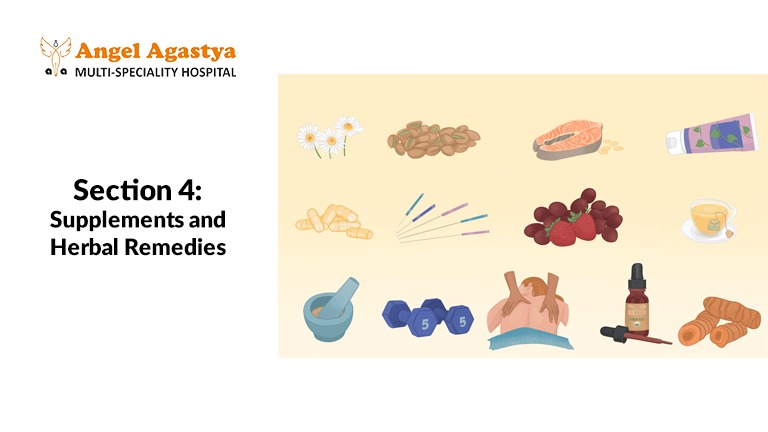
Omega-3 Fatty Acids
As mentioned earlier, omega-3 fatty acids, particularly those found in fish oil (EPA and DHA), are known for their anti-inflammatory properties. Taking an omega-3 supplement can help reduce the inflammatory response in the body and alleviate some of the pain associated with endometriosis. Fish oil supplements are powerful allies in reducing inflammation and achieving endometriosis relief
Curcumin
Curcumin, the active compound in turmeric, has been studied for its powerful anti-inflammatory and antioxidant effects. Incorporating turmeric into your diet or taking curcumin supplements may help reduce inflammation and alleviate the discomfort of endometriosis.The anti-inflammatory properties of curcumin can greatly support endometriosis relief.
Other Supplements
1. Vitamin D:Many women with endometriosis are found to be deficient in vitamin D, which can contribute to inflammation and immune system dysregulation. Supplementing with vitamin D may help modulate the immune response and reduce pain.
2. Magnesium: Magnesium plays a role in muscle relaxation and can help alleviate menstrual cramps and pelvic pain. Magnesium-rich foods like leafy greens, nuts, and seeds can be beneficial, or you can take magnesium supplements.
Always consult with a healthcare provider before starting any supplements, especially if you are taking other medications or have existing health conditions.
Seeking Professional Help for Endometriosis Relief
Consulting a gynecologist or endometriosis specialist is vital. They can provide treatments such as hormonal therapy and personalized strategies for endometriosis relief. Combining medical treatment with lifestyle changes offers the best outcomes for achieving lasting endometriosis relief.
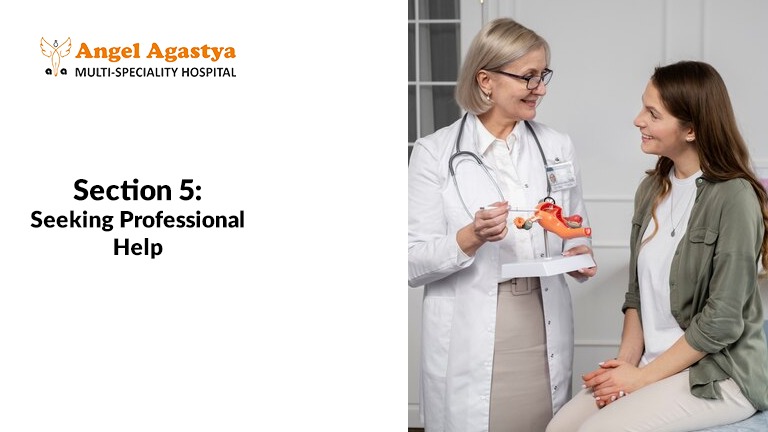
Consulting a Healthcare Provider
If you suspect you have endometriosis or are experiencing symptoms, it’s important to consult a healthcare provider for a proper diagnosis. Diagnostic tools like pelvic exams, ultrasounds, and laparoscopy can help confirm the presence of endometriosis.
Finding a Specialist
Endometriosis can be a complex condition to manage, and it often requires specialized care. Working with a gynecologist or endometriosis specialist can help you explore treatment options such as hormonal therapy, pain management, and in some cases, surgery.
Treatment approaches vary depending on the seriousness of the condition, but addressing inflammation through a combination of medical treatments and lifestyle changes often yields the best results.
Conclusion
Managing endometriosis is a lifelong journey, but by focusing on reducing inflammation through diet, lifestyle changes, and targeted supplements, you can achieve sustainable endometriosis relief.. Remember, everyone’s body responds differently, so it’s important to develop a personalized plan that works for you. Always work closely with your healthcare provider to ensure the best possible outcomes.
Endometriosis may be a challenging condition, but with the right approach, you can reclaim control over your body and reduce the impact of inflammation on your daily life.Remember, endometriosis relief is possible with persistence, a tailored plan, and collaboration with healthcare professionals.
FAQs
1.How does inflammation affect endometriosis relief?
Addressing inflammation is central to achieving endometriosis relief.
2.What are the dietary recommendations for endometriosis relief?
An anti-inflammatory diet rich in omega-3s and antioxidants supports endometriosis relief.
3.Can stress management techniques aid in endometriosis relief?
Yes, mindfulness practices are effective in promoting endometriosis relief.
4. How can I manage stress and anxiety associated with endometriosis?
Techniques like meditation, yoga, and journaling can help reduce stress and anxiety.
5. Are there specific exercises that can help with endometriosis pain?
Low-impact exercises like yoga, walking, and swimming can alleviate pain and improve overall health.
6. What are the benefits of acupuncture for endometriosis pain?
Acupuncture may help reduce pelvic pain and improve blood flow, offering relief for some women.
7. Can supplements help reduce endometriosis symptoms?
Omega-3 fatty acids, curcumin, and magnesium are among the supplements that may help reduce inflammation and pain.
8. When should I seek professional help for endometriosis?
Seek medical advice if you experience severe pain, heavy menstrual bleeding, or difficulty conceiving.
9. What are the long-term effects of endometriosis?
Long-term effects can include chronic pain, infertility, and in some cases, the need for surgical intervention.
10. How can I find support groups for women with endometriosis?
Online forums, social media groups, and local organizations can provide support and connection with others facing similar challenges.

